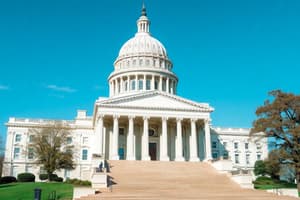Podcast
Questions and Answers
What type of cases do tribunals commonly address?
What type of cases do tribunals commonly address?
- Traffic violations
- Family disputes
- Criminal offenses
- Tax, employment, and immigration (correct)
What is a key characteristic that differentiates tribunals from government decision-making bodies?
What is a key characteristic that differentiates tribunals from government decision-making bodies?
- Tribunals operate under strict performance targets.
- Tribunals are part of the executive branch.
- Tribunals emphasize adjudication on individual cases. (correct)
- Tribunals have a bureaucratic structure.
Which department is NOT mentioned as involved in initial government decision-making?
Which department is NOT mentioned as involved in initial government decision-making?
- HM Revenue & Customs (HMRC)
- Department of Education (correct)
- Home Office
- Department for Work & Pensions (DWP)
Which aspect of tribunal operations is highlighted as problematic in government decision-making?
Which aspect of tribunal operations is highlighted as problematic in government decision-making?
What is the general perception of decision-makers within bureaucratic government departments as indicated?
What is the general perception of decision-makers within bureaucratic government departments as indicated?
What significant change was introduced by the Tribunals, Courts and Enforcement Act 2007?
What significant change was introduced by the Tribunals, Courts and Enforcement Act 2007?
Which values did the Franks Report recommend for tribunal operation?
Which values did the Franks Report recommend for tribunal operation?
What is the primary characteristic of decision-making in DWP compared to tribunals?
What is the primary characteristic of decision-making in DWP compared to tribunals?
How did tribunals originally function before significant reforms in the mid-20th century?
How did tribunals originally function before significant reforms in the mid-20th century?
What process involves no hearings and decisions are made through documentation?
What process involves no hearings and decisions are made through documentation?
What aspect of tribunal decision-making is often criticized in relation to DWP's process?
What aspect of tribunal decision-making is often criticized in relation to DWP's process?
What was a notable consequence of the reforms suggested by the Franks Report?
What was a notable consequence of the reforms suggested by the Franks Report?
What advantage do tribunal processes have over DWP decision-making?
What advantage do tribunal processes have over DWP decision-making?
What is the overriding objective of tribunal procedures?
What is the overriding objective of tribunal procedures?
Which of the following is NOT a factor that tribunals must consider under their overriding objective?
Which of the following is NOT a factor that tribunals must consider under their overriding objective?
What does 'jurisdiction' refer to in the context of tribunal procedures?
What does 'jurisdiction' refer to in the context of tribunal procedures?
What happens if a tribunal acts outside its statutory jurisdiction?
What happens if a tribunal acts outside its statutory jurisdiction?
Which tribunal procedure allows for a case to be reconsidered before an appeal is formally made?
Which tribunal procedure allows for a case to be reconsidered before an appeal is formally made?
In which scenario does a tribunal have the authority to make decisions?
In which scenario does a tribunal have the authority to make decisions?
Which of the following statements about tribunal procedures is accurate?
Which of the following statements about tribunal procedures is accurate?
What type of hearings can a tribunal conduct according to its procedures?
What type of hearings can a tribunal conduct according to its procedures?
What is the burden of proof on the appellant in tribunal appeals?
What is the burden of proof on the appellant in tribunal appeals?
What was a critical error made by the judge in the immigration appeal example?
What was a critical error made by the judge in the immigration appeal example?
In the example of the judge with four appeals, what was the judge's main approach to managing the case?
In the example of the judge with four appeals, what was the judge's main approach to managing the case?
What should judges explain in their rulings according to the content?
What should judges explain in their rulings according to the content?
What was the Home Office's basis for appealing to the Upper Tribunal in the asylum appeal?
What was the Home Office's basis for appealing to the Upper Tribunal in the asylum appeal?
Why might a judge dismiss an appeal regarding poorly organized evidence?
Why might a judge dismiss an appeal regarding poorly organized evidence?
What must judges base their conclusions about an appellant's credibility on?
What must judges base their conclusions about an appellant's credibility on?
What can happen if a judge reverses the burden of proof in their decision?
What can happen if a judge reverses the burden of proof in their decision?
What percentage of appeals are typically allowed by the tribunal?
What percentage of appeals are typically allowed by the tribunal?
What is one of the reforms introduced by the government to improve initial decisions?
What is one of the reforms introduced by the government to improve initial decisions?
Which type of cases now primarily go to immigration tribunals after the Immigration Act 2014?
Which type of cases now primarily go to immigration tribunals after the Immigration Act 2014?
Which of the following statements about the burden of proof in immigration appeals is true?
Which of the following statements about the burden of proof in immigration appeals is true?
What is the primary focus of over 95% of judicial decision-making according to the content?
What is the primary focus of over 95% of judicial decision-making according to the content?
What are the initial steps before a claimant can go to a tribunal following the reforms?
What are the initial steps before a claimant can go to a tribunal following the reforms?
What is indicated about the quality of representation for most appellants?
What is indicated about the quality of representation for most appellants?
What does the content suggest about the fact-finding process in appeals?
What does the content suggest about the fact-finding process in appeals?
What is the primary purpose of the Upper Tribunal?
What is the primary purpose of the Upper Tribunal?
Who appoints the First-tier Tribunal judges and members?
Who appoints the First-tier Tribunal judges and members?
Which of the following is NOT a function of the Upper Tribunal?
Which of the following is NOT a function of the Upper Tribunal?
What characterizes members of the tribunals?
What characterizes members of the tribunals?
What is the main role of HM Courts and Tribunals Service (HMCTS)?
What is the main role of HM Courts and Tribunals Service (HMCTS)?
Which chambers are included in the First-tier Tribunal?
Which chambers are included in the First-tier Tribunal?
What is a unique feature of tribunal composition?
What is a unique feature of tribunal composition?
Which tribunal handles appeals against parking and traffic penalty charge notices?
Which tribunal handles appeals against parking and traffic penalty charge notices?
Flashcards
Tribunals
Tribunals
Specialist courts that hear cases like tax and immigration.
Purpose of Tribunals
Purpose of Tribunals
Tribunals adjudicate cases with judicial independence and fair procedures.
Initial Government Decision-making
Initial Government Decision-making
Government departments make initial decisions on benefits, visas, and taxes.
Pressure on Decision-makers
Pressure on Decision-makers
Signup and view all the flashcards
Difference from Courts
Difference from Courts
Signup and view all the flashcards
Judicial Independence
Judicial Independence
Signup and view all the flashcards
HMCTS Purpose
HMCTS Purpose
Signup and view all the flashcards
First-tier Tribunal
First-tier Tribunal
Signup and view all the flashcards
Upper Tribunal Functions
Upper Tribunal Functions
Signup and view all the flashcards
Chambers in Tribunals
Chambers in Tribunals
Signup and view all the flashcards
Non-legal Tribunal Members
Non-legal Tribunal Members
Signup and view all the flashcards
Composition of Tribunal Panels
Composition of Tribunal Panels
Signup and view all the flashcards
Appointment of Tribunal Members
Appointment of Tribunal Members
Signup and view all the flashcards
Quality of Decision-Making
Quality of Decision-Making
Signup and view all the flashcards
Tribunal Hearing Types
Tribunal Hearing Types
Signup and view all the flashcards
Historical Development of Tribunals
Historical Development of Tribunals
Signup and view all the flashcards
Franks Report 1957
Franks Report 1957
Signup and view all the flashcards
Tribunals and Inquiries Act 1958
Tribunals and Inquiries Act 1958
Signup and view all the flashcards
Tribunals, Courts and Enforcement Act 2007
Tribunals, Courts and Enforcement Act 2007
Signup and view all the flashcards
Judicial Independence of Tribunals
Judicial Independence of Tribunals
Signup and view all the flashcards
Role of Tribunal members
Role of Tribunal members
Signup and view all the flashcards
Overriding Objective of Tribunals
Overriding Objective of Tribunals
Signup and view all the flashcards
Jurisdiction
Jurisdiction
Signup and view all the flashcards
Statutory Jurisdiction
Statutory Jurisdiction
Signup and view all the flashcards
Consequences of Lack of Jurisdiction
Consequences of Lack of Jurisdiction
Signup and view all the flashcards
Adversarial vs Inquisitorial
Adversarial vs Inquisitorial
Signup and view all the flashcards
Standard of Proof
Standard of Proof
Signup and view all the flashcards
Oral Hearings
Oral Hearings
Signup and view all the flashcards
Legal Representation
Legal Representation
Signup and view all the flashcards
Burden of Proof
Burden of Proof
Signup and view all the flashcards
Immigration Appeal Example
Immigration Appeal Example
Signup and view all the flashcards
Error of Law
Error of Law
Signup and view all the flashcards
Proportionate Approach
Proportionate Approach
Signup and view all the flashcards
Key Conflicts Resolution
Key Conflicts Resolution
Signup and view all the flashcards
Credibility in Asylum Appeals
Credibility in Asylum Appeals
Signup and view all the flashcards
Upper Tribunal
Upper Tribunal
Signup and view all the flashcards
Minor Evidence Points
Minor Evidence Points
Signup and view all the flashcards
Appeal Process Duration
Appeal Process Duration
Signup and view all the flashcards
Appeals Allowed Rate
Appeals Allowed Rate
Signup and view all the flashcards
Mandatory Reconsideration
Mandatory Reconsideration
Signup and view all the flashcards
Immigration Appeals Changes
Immigration Appeals Changes
Signup and view all the flashcards
Judicial Review
Judicial Review
Signup and view all the flashcards
Fact-Finding Role
Fact-Finding Role
Signup and view all the flashcards
Quality of Representation
Quality of Representation
Signup and view all the flashcards
Study Notes
Lecture 10: Tribunals
- Tribunals are a type of specialist court, similar to courts, but with unique structures and procedures
- Learning outcomes include discussing tribunal organization, explaining their function, and critically examining their effectiveness
- Initial government decision-making involves various government departments receiving applications (e.g., benefits, immigration, taxation)
- Huge bureaucratic processes and departmental pressures often lead to decisions impacting many people negatively
- Decision-makers often lack personal connection with the individuals affected by their decisions
- Tribunals are overseen by various bodies, including Ombudsman bodies, the Supreme Court, Courts of Appeal, Upper Tribunals, and Administrative Courts
- Tribunals have no universally accepted definition
- Tribunals in the UK are specialist courts that hear a wide range of cases (tax, employment, immigration, asylum)
- Tribunals are characterized by independence and fair procedures, which are better at adjudicating cases
- Tribunals have advantages of mass processing, but quality can be inconsistent and subject to political pressures
- Tribunals were first established in 1799 (income tax appeals)
- During the 20th century, tribunals proliferated alongside the growth of the welfare state
- Tribunals are originally administrative bodies, and their members are appointed by government ministers. Government departments maintain responsibility for their administration
- In 1955, the Franks Committee reviewed tribunal operations and recommended fairness, openness, and impartiality
- The Tribunals and Inquiries Act 1958 introduced measures such as supervising tribunal work, requiring reasoning in decisions, and creating appeal rights
- The Tribunals, Courts and Enforcement Act 2007 (TCEA) unified tribunals by creating First-tier and Upper Tribunals
- The TCEA brought tribunals into the judicial system, ensuring tribunal members had the same judicial independence as court judges and established the HMCTS (Home Office Courts of Tribunal and Settlement in the UK)
- Tribunals are divided into chambers with specific areas of specialization
- The role and responsibilities of the various chambers are outlined
- There are Tribunals outside of the First-tier and Upper Tribunal structures (School Exclusion Panels, Property Valuation Tribunals, Traffic Penalty Tribunal, and the Investigatory Powers Tribunal)
- Tribunal members include judges (legally qualified) and non-legal members (specialists in specific areas of knowledge)
- FTT judges and members are appointed by the Senior President of Tribunals
- UT judges are appointed by the Crown on the recommendation of the Lord Chancellor
- Appointments for Non-judge members are made by the Senior President of Tribunals after selection by the Judicial Appointments Commission
- The tribunal must consider the rules of evidence, find the relevant legal rules and apply the law to the findings of fact. To complete this, they must decide if evidence is acceptable or not and make reasonable findings
- Tribunal procedures include pre-appeal reconsiderations, oral hearings and paper appeals, representation & legal aid; adversarial v inquisitorial approaches, standards and burdens of proof, and appeal to the UT or Court of Appeal.
- Tribunals must provide detailed reasons for their decisions to prevent issues concerning reason-giving
- A right of appeal from the First Tier Tribunal (FTT) to the Upper Tribunal (UT) is permitted; however, exceptions exist, and permission for appeal is often required
- Appeals to the UT are generally confined to errors of law
- The tribunal process also involves online dispute resolution (e.g. Traffic Penalty Tribunal) and the procedures to challenge government decisions before tribunals
Studying That Suits You
Use AI to generate personalized quizzes and flashcards to suit your learning preferences.
Related Documents
Description
This quiz explores the functions and characteristics of tribunals in contrast to government decision-making bodies. It highlights the common cases addressed by tribunals and examines perceptions of decision-makers in bureaucratic settings. Test your knowledge of tribunal operations and their challenges in governance.




